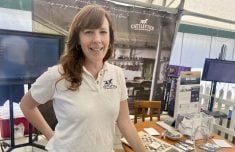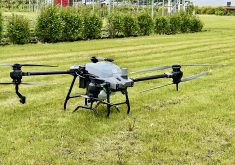Let’s say your family owns a grain trading house in Turkey. It’s been good business, especially the market you’ve built up over the past 50 years trading pulse crops. But lately, the farmers around you have stopped planting pulses as weather conditions and government programs persuade them to grow other crops.
In desperation, at first you begin to import more and more pulses from a place halfway around the world. It’s Saskatchewan, a place with a funny name that you can barely pronounce, much less fathom the region’s unique and exotic customs.
Read Also

Producers aren’t panicking over tariffs and trade threats
The Manitoba Canola Growers Association (MCGA) surveyed its members this spring to get a sense of how trade uncertainty was…
You’ve heard of a game there that involves sliding heavy rocks on frozen water. There’s another called “hockey,” where you strap knives to your feet and chase a little rubber disc — also on frozen water.
They seem to enjoy “country music” and you’re told the national drink is something called “Pilsner.” Everyone you meet seems to be emotionally invested in football, but they play it without a net!
International business is never easy — and it’s never been more necessary. But the history of international business is littered with the bones of companies that simply didn’t take into account the culture gap, and failed spectacularly as a result.
There’s the company that exported cooking oil to Latin America without realizing the brand name translated literally to “Jackass Oil.” Or American Motors, back in the day, marketing the Matador in Puerto Rico only to find out later that in the local dialect in meant “killer” — hardly a hit on a mountainous island with steep and winding roads.
There are also the every day slips that can insult your host, such as relaxing with your feet on your desk in Saudi Arabia, or not finishing the last drop of your tea in Japan.
It’s a minefield, and more and more companies are looking for experienced guides to help them navigate a safe path through it.
Now, let’s return to our Turkish pulse traders. The company and situation are real. Arbel Group, based in the Mediterranean port city of Mersin, has been one of the leading pulse traders in the region for a half-century.
The Arslan brothers have continued to build the family business, and with recent developments in pulse production, that means doing business with pulse growers elsewhere, says CEO Huysein Arslan.
The name Saskatchewan came up quickly. “At that time, Australia was more popular on the world stage for originating the product, but during trips to Saskatchewan, I was convinced that Canada would be better starting point,” Arslan says. “This was mostly due to [research and development] in Saskatchewan and the Saskatchewan ministry of agriculture’s approach to the sector.”
Initially the company began buying Canadian pulses — mainly lentils — and processing and packaging them at home in Turkey. However, this was far from a seamless process and the company wound up with quality control concerns.
Uncertain how to proceed, Arslan wrote a letter to the Canadian embassy in Turkey, expressing his concern.
A few days later, the answer to all his problems walked into his office — literally. A Saskatchewan boy from the province’s Saskatchewan Trade and Export Partnership (STEP) program just happened to be in Turkey on a trade mission. The embassy had told him of the letter and he took it upon himself to go and talk to the three Arslan brothers and try to work through any problems.
But this was a Saskatchewan boy with a difference. He spoke fluent Turkish. He had an advanced degree in international business from a prestigious U. S. university. He’d worked at the World Bank, concentrating on emerging markets. In short, he walked into that room carrying a resumé that would open doors anywhere, yet he’d made the conscious decision to return home.
The man walking in the door was Murad Al-Katib and his business was the business of Saskatchewan.
“I could have gone anywhere, I suppose,” Al-Katib told Country Guide during a recent interview. “But even when I was going to school in Arizona, or working at the World Bank in Washington, I was homesick. I missed Saskatchewan. It’s my home.”
It was during this stint in the U. S. that Al-Katib took an unusual step for someone just in his mid-20s. He fired up his computer and wrote a letter to then-Saskatchewan premier Roy Romanow, making the case for a development strategy that targeted emerging markets, where the opportunities of the future lay.
A few weeks later, his telephone rang. It was a senior mandarin from the premier’s office with a request : “Come in for a chat.” The result of that meeting was a position working on trade development for STEP.
Al-Katib was involved in everything from making links between Saskatchewan farm equipment manufacturers and Ukrainian growers, to the emerging international pulse markets — which is how he became acquainted with Arbel Group and the Arslan family.
When he walked in the door at Arbel’s headquarters, Huysein Arslan said it became rapidly apparent he brought some unique skills to the table.
“ I always tell young people, whenever I speak to them, create your own opporunities.”
— Murad Al-Katib
“Although we were used to seeing bilingual people, I was surprised to see a rural Saskatchewan boy speaking Turkish,” Arslan explains. “I had very positive impression of him, especially with his passion for business.”
Working with the Canadian Grain Commission to enforce tight quality parameters, Al-Katib and his STEP colleagues moved quickly to alleviate Arbel Group’s quality assurance concerns, and out of those initial contacts, a relationship was formed. When Arbel had questions about Saskatchewan, they now knew who to call.
One day they asked Murad Al-Katib to meet with them on another troubling question. Why did companies in the Saskatchewan pulse sector show so little interest in value-added processing? Why were they content to export raw commodities, and not invest in their industry?
“After unsatisfactory meetings with companies and groups, I called Murad to meet me at six o’clock in the morning in my hotel room,” Arslan recounts.
The topic of the meeting? Would a young man with a good government job throw in his lot with a Turkish family with big plans for expansion in Saskatchewan?
The result of that impromptu meeting was an agreement to form a joint venture that would see Arbel as the largest shareholder in a yet-to-be-named operation. Arbel, already a world-leading pulse processor, would contribute technology and expertise; in return it would get valuable local involvement.
Wanting to share its knowledge with a local partner might seem a bit counterintuitive, but Arslan says the model has served them well in their other foreign ventures.
“We always wish to have local partners as we cannot know their country better than them,” Arslan explains. “You should have people thinking as local people think. They should feel the people and understand their culture and problems.”
This philosophy is nothing but astute business, says one American academic. Ethan Zuckerman is a fellow at the Berkman Centre for Internet and Society at Harvard University. He’s been studying how cultural knowledge opens doors in the information age as the world continues to become smaller and more trade-oriented. He says the SaskCan Pulse Trading model is a great example of the value of people who can bridge cultures.
“If you’re able to view the world around you from a number of different points of view, you have a natural advantage in a globalized world,” Zuckerman says.
Zuckerman says you can see companies beginning to identify the value these folks bring to the table, particularly in markets that are less homogenous than North America, such as Europe, where many different cultures participate in one single economy. There, companies are actively identifying and hiring executives who are not from the same country as the company itself — meaning a French company, for example, may be interested in finding a Swedish executive to head up the firm.
Explains Zuckerman: “If you can find someone who comes to the table without the narrow assumptions like ‘This is how we do business in France,’ you’re going to have a strategic advantage when you’re working on an international scale.”
Back home in Saskatchewan, Al-Katib, after conferring with his wife Michelle, who was five-and-a-half months pregnant with twins at the time, took up the challenge. He sat down and started pondering what to call the company, drawing a few words on a piece of cardboard. Two of those jumped out at him — Saskatchewan and Canada — and with that, SaskCan was born about six years ago, although admittedly there wasn’t much to show for it, other than a home office in the basement of the Al-Katib household.
There was also a burning need to answer another question: How could a pulse processor the become preferred partner of local farmers? For this, Al-Katib turned to local knowledge: he went to visit his father.
The senior Al-Katib had been practising medicine for 30 years at Davidson, half-way between Regina and Saskatoon, and he knew pretty much everyone in the area as a result.
“I said, ‘Dad, I need the names of 10 farmers I can trust,’” Murad recalls. “He thought about it for a minute, and started writing names down.”
The next step was sitting down and talking straightforwardly with these farmers. What was wrong with the pulse
“ I always tell young people, whenever I speak to them, create your own opporunities.”
— Murad Al-Katib
“Although we were used to seeing bilingual people, I was surprised to see a rural Saskatchewan boy speaking Turkish,” Arslan explains. “I had very positive impression of him, especially with his passion for business.”
Working with the Canadian Grain Commission to enforce tight quality parameters, Al-Katib and his STEP colleagues moved quickly to alleviate Arbel Group’s quality assurance concerns, and out of those initial contacts, a relationship was formed. When Arbel had questions about Saskatchewan, they now knew who to call.
One day they asked Murad Al-Katib to meet with them on another troubling question. Why did companies in the Saskatchewan pulse sector show so little interest in value-added processing? Why were they content to export raw commodities, and not invest in their industry?
“After unsatisfactory meetings with companies and groups, I called Murad to meet me at six o’clock in the morning in my hotel room,” Arslan recounts.
The topic of the meeting? Would a young man with a good government job throw in his lot with a Turkish family with big plans for expansion in Saskatchewan?
The result of that impromptu meeting was an agreement to form a joint venture that would see Arbel as the largest shareholder in a yet-to-be-named operation. Arbel, already a world-leading pulse processor, would contribute technology and expertise; in return it would get valuable local involvement.
Wanting to share its knowledge with a local partner might seem a bit counterintuitive, but Arslan says the model has served them well in their other foreign ventures.
“We always wish to have local partners as we cannot know their country better than them,” Arslan explains. “You should have people thinking as local people think. They should feel the people and understand their culture and problems.”
This philosophy is nothing but astute business, says one American academic. Ethan Zuckerman is a fellow at the Berkman Centre for Internet and Society at Harvard University. He’s been studying how cultural knowledge opens doors in the information age as the world continues to become smaller and more trade-oriented. He says the SaskCan Pulse Trading model is a great example of the value of people who can bridge cultures.
“If you’re able to view the world around you from a number of different points of view, you have a natural advantage in a globalized world,” Zuckerman says.
Zuckerman says you can see companies beginning to identify the value these folks bring to the table, particularly in markets that are less homogenous than North America, such as Europe, where many different cultures participate in one single economy. There, companies are actively identifying and hiring executives who are not from the same country as the company itself — meaning a French company, for example, may be interested in finding a Swedish executive to head up the firm.
Explains Zuckerman: “If you can find someone who comes to the table without the narrow assumptions like ‘This is how we do business in France,’ you’re going to have a strategic advantage when you’re working on an international scale.”
Back home in Saskatchewan, Al-Katib, after conferring with his wife Michelle, who was five-and-a-half months pregnant with twins at the time, took up the challenge. He sat down and started pondering what to call the company, drawing a few words on a piece of cardboard. Two of those jumped out at him — Saskatchewan and Canada — and with that, SaskCan was born about six years ago, although admittedly there wasn’t much to show for it, other than a home office in the basement of the Al-Katib household.
There was also a burning need to answer another question: How could a pulse processor the become preferred partner of local farmers? For this, Al-Katib turned to local knowledge: he went to visit his father.
The senior Al-Katib had been practising medicine for 30 years at Davidson, half-way between Regina and Saskatoon, and he knew pretty much everyone in the area as a result.
“I said, ‘Dad, I need the names of 10 farmers I can trust,’” Murad recalls. “He thought about it for a minute, and started writing names down.”
The next step was sitting down and talking straightforwardly with these farmers. What was wrong with the pulse
industry? What did they need to make it a better option for their farms?
Sitting around those kitchen tables, the same two major themes kept surfacing. Farmers weren’t getting enough information about what was making the markets move, and when they did deliver their product, they waited far too long to get paid.
“I realized that we needed to have enough money to pay farmers quickly,” Al-Katib says. “If we couldn’t do that, there was no point.”
Increasingly, Arbel was proving vital for the new company’s success. With its share purchase, Arbel provided the new entity with enough working capital to institute a nine-day payment promise: if a farmer delivered to SaskCan, they’d have a check in under 10 business days.
Likewise, on the production side, there were also challenges. Again, the Turkish partners proved invaluable. They brought proprietary technology, along with a group of seven Turkish “splitmasters” who knew how to make the equipment work under even the most challenging conditions, and who were willing and able to relocate to the Regina area and become Canadian citizens.
“There’s one individual who’s in his mid-30s and he’s been working for Arbel since he was 14, when he became an apprentice after finishing his basic education,” Al-Katib explains. “That’s just one example of the incredible kind of intellectual capital this company brought to the table.”
It’s a good thing too, because those splitmasters found that processing pulses in Saskatchewan was a completely different game. The crop and the equipment might be the same, but everything else was different.
What could be so different? “Temperature,” Al-Katib says with a grin. “When you bring in product at 40 below, it just doesn’t react the same way.”
The result was an inevitable spate of quality control issues, as the new plant struggled to work the kinks out of a proven process under completely unproven conditions. In retrospect, Al-Katib says it’s a good thing that the plant was already on the ground before reality hit home for the investors, including himself.
“If we knew then what we know now… I’m not sure if we’d have gone ahead,” Al-Katib says frankly.
Eventually the bugs were all worked out however, and farmers and end-use customers began to notice the new company’s way of doing business made them a good partner, and the company began expanding rapidly.
First came the plant near Regina with its full complement of production employees and a half-dozen management staffers. Today there are dozens of employees sharing the same cramped quarters, as the finishing touches go on a gleaming new office building just next door.
From a standing start, the company has grown to more than $300 million in annual sales, and Al-Katib sees nowhere to go but up.
“We’re thinking about how to make this into a billion-dollar company,” he says matter-of-factly, without a hint of bravado.
The key is a strategy that sees the company diversify in a few important ways. They’re pursuing opportunities for the traditional pulse product lines in new locations such as the U. S. and Australia (see related story).
They’re also pursuing new product lines and other pulse crops in an effort to bulletproof the operation from the inevitable ups and downs of a cyclical business.
Along the way, says Al-Katib, the secret will be to stay true to his core values. It’s these values, he has learned, which are actually the most international aspect of his international business.
I ask him: “Let’s say it’s 30 years from now and the grandkids are gathered around you. What do you hope to be able to look back and say you’ve accomplished?”
“I would like,” responds Al-Katib, “to be able to say ‘I ran a business. I ran it well. I ran it with good ethics and I created opportunities for families.’
“That’s really our philosophy. We feel that every person that works for us, we have a responsibility to them and their families and that’s something that today I’m proud of.” CG
industry? What did they need to make it a better option for their farms?
Sitting around those kitchen tables, the same two major themes kept surfacing. Farmers weren’t getting enough information about what was making the markets move, and when they did deliver their product, they waited far too long to get paid.
“I realized that we needed to have enough money to pay farmers quickly,” Al-Katib says. “If we couldn’t do that, there was no point.”
Increasingly, Arbel was proving vital for the new company’s success. With its share purchase, Arbel provided the new entity with enough working capital to institute a nine-day payment promise: if a farmer delivered to SaskCan, they’d have a check in under 10 business days.
Likewise, on the production side, there were also challenges. Again, the Turkish partners proved invaluable. They brought proprietary technology, along with a group of seven Turkish “splitmasters” who knew how to make the equipment work under even the most challenging conditions, and who were willing and able to relocate to the Regina area and become Canadian citizens.
“There’s one individual who’s in his mid-30s and he’s been working for Arbel since he was 14, when he became an apprentice after finishing his basic education,” Al-Katib explains. “That’s just one example of the incredible kind of intellectual capital this company brought to the table.”
It’s a good thing too, because those splitmasters found that processing pulses in Saskatchewan was a completely different game. The crop and the equipment might be the same, but everything else was different.
What could be so different? “Temperature,” Al-Katib says with a grin. “When you bring in product at 40 below, it just doesn’t react the same way.”
The result was an inevitable spate of quality control issues, as the new plant struggled to work the kinks out of a proven process under completely unproven conditions. In retrospect, Al-Katib says it’s a good thing that the plant was already on the ground before reality hit home for the investors, including himself.
“If we knew then what we know now… I’m not sure if we’d have gone ahead,” Al-Katib says frankly.
Eventually the bugs were all worked out however, and farmers and end-use customers began to notice the new company’s way of doing business made them a good partner, and the company began expanding rapidly.
First came the plant near Regina with its full complement of production employees and a half-dozen management staffers. Today there are dozens of employees sharing the same cramped quarters, as the finishing touches go on a gleaming new office building just next door.
From a standing start, the company has grown to more than $300 million in annual sales, and Al-Katib sees nowhere to go but up.
“We’re thinking about how to make this into a billion-dollar company,” he says matter-of-factly, without a hint of bravado.
The key is a strategy that sees the company diversify in a few important ways. They’re pursuing opportunities for the traditional pulse product lines in new locations such as the U. S. and Australia (see related story).
They’re also pursuing new product lines and other pulse crops in an effort to bulletproof the operation from the inevitable ups and downs of a cyclical business.
Along the way, says Al-Katib, the secret will be to stay true to his core values. It’s these values, he has learned, which are actually the most international aspect of his international business.
I ask him: “Let’s say it’s 30 years from now and the grandkids are gathered around you. What do you hope to be able to look back and say you’ve accomplished?”
“I would like,” responds Al-Katib, “to be able to say ‘I ran a business. I ran it well. I ran it with good ethics and I created opportunities for families.’
“That’s really our philosophy. We feel that every person that works for us, we have a responsibility to them and their families and that’s something that today I’m proud of.” CG















